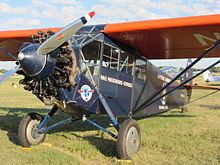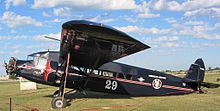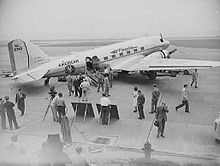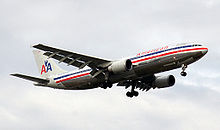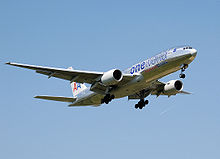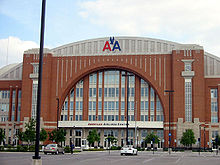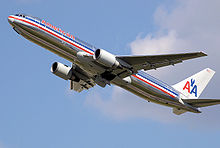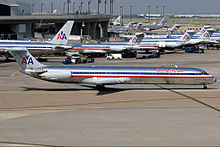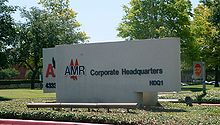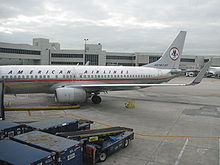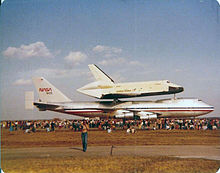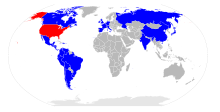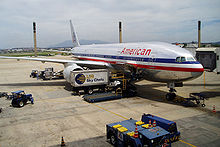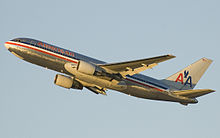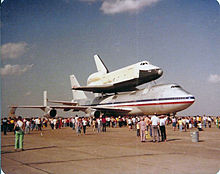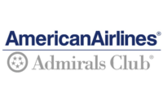- American Airlines
-
American Airlines 
IATA
AAICAO
AALCallsign
AMERICANFounded 1930 (as American Airways) Commenced operations 1934 Hubs Focus cities LaGuardia Airport (New York) Frequent-flyer program AAdvantage Airport lounge Admirals Club Alliance Oneworld Fleet size 616 (+559 orders) Destinations 260+ excl. code-shares[2] Company slogan We know why you fly. Parent company AMR Corporation Headquarters Fort Worth, Texas Key people Gerard Arpey
(Chairman and CEO)
Tom Horton
(President)[3]Revenue  US$ 22.17 billion (2010)[4]
US$ 22.17 billion (2010)[4]Operating income  US$ 308 million (2010)[4]
US$ 308 million (2010)[4]Net income  US$ -471 million (2010)[4]
US$ -471 million (2010)[4]Total assets  US$ 25.09 billion (2010)[4]
US$ 25.09 billion (2010)[4]Total equity  US$ -3.95 billion (2010)[4]
US$ -3.95 billion (2010)[4]Website AA.com American Airlines, Inc. (AA) is the world's fourth largest airline in passenger miles transported[5] and operating revenues. American Airlines is a subsidiary of the AMR Corporation and is headquartered in Fort Worth, Texas adjacent to its largest hub at Dallas/Fort Worth International Airport. American operates an extensive international and domestic network, with scheduled flights throughout North America, Latin and South America, Europe, Asia/Pacific and the Caribbean.
American Airlines was listed at No.120 on the Fortune 500 list of companies in 2010 and is a founding member of the Oneworld airline alliance.[6]
Overview
In May 2008, American served 260 cities (excluding codeshares with partner airlines) with 655 aircraft.[7] American carries more passengers between the US and Latin America (12.1 million in 2004) than any other airline, and is also strong in the transcontinental and domestic markets.
American has five hubs: Dallas/Fort Worth (DFW), Chicago (ORD), Miami (MIA), New York (JFK), and Los Angeles (LAX).[8] Dallas/Fort Worth is the airline's largest hub, with AA operating 85 percent of flights at the airport and traveling to more destinations than from its other hubs. New York-LaGuardia serves as a focus city. American currently operates maintenance bases at Tulsa (TUL) and Fort Worth Alliance (AFW). American closed its maintenance base at Kansas City (MCI) on September 24, 2010.[9]
American Airlines has three regional carriers, of which two are owned by American's parent, AMR Corporation and one is owned by a third party.
- American Eagle Airlines operates as "American Eagle" with hubs in Chicago O'Hare, Dallas/Fort Worth, New York LaGuardia, Los Angeles, Miami and San Juan. The airline provides regional feed for American throughout North America, flying regional jets from American's hubs. American Eagle is wholly owned by AMR Corporation, the parent company of American Airlines.[10] It plans to end ties with American Airlines and to become an independent airline.[11]
- Executive Airlines operates as "American Eagle" with hubs in Miami and San Juan. Executive flies Super ATR turboprops throughout the Caribbean. Executive Airlines is a wholly owned subsidiary of American Eagle and, by extension, AMR.
- Chautauqua Airlines operates as "AmericanConnection", feeding American's flights from its Chicago O'Hare Hub (transferred from St Louis April 6, 2010). Chautauqua is owned by Republic Airways Holdings, a separate company with no affiliation to AMR.[12]
History
Formation
American Airways was developed from a conglomeration of 82 small airlines through acquisitions and reorganizations: initially, American Airways was a common brand by a number of independent carriers. These included Southern Air Transport in Texas, Southern Air Fast Express (SAFE) in the western US, Universal Aviation in the Midwest (which operated a transcontinental air/rail route in 1929), Thompson Aeronautical Services (which operated a Detroit-Cleveland route beginning in 1929) and Colonial Air Transport in the Northeast.
American Airlines before World War II
In 1934, American Airways Company was acquired by E.L. Cord, who renamed it "American Air Lines". Cord hired Texas businessman C.R. (Cyrus Rowlett) Smith to run the company.
Smith worked with Donald Douglas to develop the DC-3, which American Airlines started flying in 1936. With the DC-3, American began calling its aircraft "Flagships" and establishing the Admirals Club for valued passengers. The DC-3s had a four-star "admiral's pennant" outside the cockpit window while the aircraft was parked, one of the most well-known images of the airline at the time.
American Airlines was first to cooperate with Fiorello LaGuardia to build an airport in New York City, and partly as a result became owner of the world's first airline lounge at the new LaGuardia Airport (LGA), which became known as the Admirals Club. Membership was initially by invitation only, but a discrimination suit decades later changed the club into a paid club, creating the model for other airline lounges.
Postwar developments
After World War II, American acquired American Export Airlines, renaming it as American Overseas Airlines, to serve Europe; AOA was sold to Pan Am in 1950. AA launched another subsidiary, Líneas Aéreas Americanas de Mexico S.A., to fly to Mexico and built several airports there. American Airlines provided advertising and free usage of its aircraft in the 1951 film Three Guys Named Mike.[13] Until Capital merged into United in 1961 AA was the largest American airline, which meant second largest in the world, after Aeroflot.
American Airlines introduced transcontinental jet service with Boeing 707s on January 25, 1959. With its 707s American shifted to nonstop coast-to-coast flights, although it maintained feeder connections to cities along its old route using smaller Convair 990s and Lockheed Electras. American invested $440 million in jet aircraft up to 1962, launched the first electronic booking system (Sabre) with IBM, and built an upgraded terminal at Idlewild (now JFK) Airport in New York City which became the airline's largest base.[14] In the 1960s, Mattel released a series of American Airlines stewardess Barbie dolls, signifying their growing commercial success.[citation needed] Vignelli Associates designed the AA eagle logo in 1967. Vignelli attributes the introduction of his firm to American Airlines to Henry Dreyfuss, the legendary AA design consultant. The logo is still in use today.
By September 1970, American Airlines was offering its first long haul international flights from St. Louis, Chicago, and New York to Honolulu and on to Sydney and Auckland via American Samoa and Nadi.[15]
A fictitious "American Airlines Space Freighter", the Valley Forge, was the setting for the 1971 science fiction movie Silent Running, starring Bruce Dern and directed by Douglas Trumbull. The freighter featured the then-new "AA" logo on the hull, along with the crew uniforms and several set pieces.
On March 30, 1973 AA became the first major airline to employ a female pilot when Bonnie Tiburzi was hired to fly Boeing 727s. American Airlines has been innovative in other aspects initiating several of the industry's major competitive developments including computer reservations systems, frequent flyer loyalty programs and two-tier wage scales.[16]
Revenue Passenger-Miles[17] (Millions) (Sched Service Only) American Trans Caribbean 1951 2554 – 1955 4358 – 1960 6371 208 1965 9195 433 1970 16623 819 1975 20871 (merged 1971) Expansion in the 1980s and 1990s
After moving headquarters to Fort Worth in 1979, American changed its routing to a hub-and-spoke system in 1981, opening its first hubs at DFW and Chicago O'Hare. Led by its new chairman and CEO, Robert Crandall, American began flights from these hubs to Europe and Japan in the mid-1980s.
In the late 1980s, American opened three hubs for north-south traffic. San Jose International Airport was added after American purchased AirCal. American also built a terminal and runway at Raleigh-Durham International Airport for the growing Research Triangle Park nearby and compete with USAir's hub in Charlotte. Nashville was also a hub. In 1988, American Airlines received its first Airbus A300B4-605R aircraft.
In 1990, American Airlines bought the assets of TWA's operations at London Heathrow for $445 million, giving American a hub there. The US/UK Bermuda II treaty, in effect until open skies came into effect in April 2008, barred U.S. airlines from Heathrow with the sole exceptions of American and United Airlines.
Lower fuel prices and a favorable business climate led to higher than average profits in the 1990s. The industry's expansion was not lost on pilots who on February 17, 1997 went on strike for higher wages. President Bill Clinton invoked the Railway Labor Act citing economic impact to the United States, quashing the strike.[18] Pilots settled for wages lower than their demands.
The three new hubs were abandoned in the 1990s: some San Jose facilities were sold to Reno Air, and at Raleigh/Durham to Midway Airlines. Midway went out of business in 2001. American purchased Reno Air in February 1999 and integrated its operations on August 31, 1999, but did not resume hub operations in San Jose. American discontinued most of Reno Air's routes, and sold most of the Reno Air aircraft, as they had with Air California 12 years earlier. The only remaining route from the Air California and Reno Air purchases is San Francisco to Los Angeles.
During this time, concern over airline bankruptcies and falling stock prices brought a warning from American's CEO Robert Crandall. "I've never invested in any airline", Crandall said. "I'm an airline manager. I don't invest in airlines. And I always said to the employees of American, 'This is not an appropriate investment. It's a great place to work and it's a great company that does important work. But airlines are not an investment.'" Crandall noted that since airline deregulation of the 1970s, 150 airlines had gone out of business. "A lot of people came into the airline business. Most of them promptly exited, minus their money", he said.[citation needed]
Miami became a hub after American bought Central and South American routes from Eastern Air Lines in 1990 (inherited from Braniff International Airways but originated by Panagra). Through the 1990s, American expanded its network in Latin America to become the dominant U.S. carrier in the region.
On October 15, 1998 American Airlines became the first airline to offer electronic ticketing in the 44 countries it serves.
In 1999 American Airlines, together with British Airways, Cathay Pacific, Canadian Airlines and Qantas, founded the global airline alliance Oneworld.
TWA merger and 9/11 to the present
Robert Crandall left in 1998 and was replaced by Donald J. Carty, who negotiated the purchase of the near bankrupt Trans World Airlines (it would file for its 3rd bankruptcy as part of the purchase agreement)[19] and its hub in St. Louis in April 2001.
The merger of seniority lists remains contentious for pilots; the groups were represented by different unions. In the merger, 60 percent of former TWA pilots moved to the bottom of the seniority list at AA. Many were furloughed, and most remain on furlough. The senior TWA captains were integrated at the same seniority level as AA captains hired years later.[citation needed] All TWA captains and first officers hired in March 1989 and later were appended to the seniority list junior to American Airlines first officers hired in June 2001. The senior TWA pilots were able to stay in captain's seats at a higher pay rate with American and were working for a solvent company. The junior TWA pilots were mostly furloughed. On the AA side the captains were mostly unaffected except that AMR inherited TWA debt which decreased the solvency of their parent company. The AA first officers saw hundreds of TWA captains maintain their captain seats even as the company downsized after the 9/11 attacks and subsequent financial crises. The extensive furloughs of former TWA pilots in the wake of the 9/11 attacks disproportionately affected St. Louis and resulted in a significant influx of American Airlines pilots into this base. For cabin crews, all former TWA flight attendants (approximately 4,200) were furloughed by mid-2003 due to the AA flight attendants' union putting TWA flight attendants at the bottom of their seniority list.
American Airlines began losing money in the wake of the TWA merger and the September 11, 2001, attacks (in which two of its planes were destroyed). Carty negotiated wage and benefit agreements with the unions but resigned after union leaders discovered he was planning to award executive compensation packages at the same time. This undermined AA's attempts to increase trust with its workforce and to increase its productivity.[16] The St. Louis hub was also downsized.
In 2002, the airline received a 100% rating on the first Corporate Equality Index released by the Human Rights Campaign in 2002 and has maintained their rating in respect to policies on employees.[citation needed]
AA has undergone additional cost-cutting, including rolling back its "More Room Throughout Coach" program (which eliminated several rows of seats on certain aircraft), ending three-class service on many international flights, and standardizing its fleet at each hub (see below). However, the airline also expanded into new markets, including Ireland, India and mainland China. On July 20, 2005, American announced a quarterly profit for the first time in 17 quarters; the airline earned $58 million in the second quarter of 2005.
AA was a strong backer of the Wright Amendment, which regulated commercial airline operations at Love Field in Dallas. On June 15, 2006, American agreed with Southwest Airlines and the cities of Dallas and Fort Worth to seek repeal of the Wright Amendment on condition that Love Field remained a domestic airport and its gate capacity be limited.[20]
In May 2008, a month after mass grounding of aircraft, American announced capacity cuts and fees to increase revenue and help cover high fuel prices. The airline increased fees such as a $15 charge for the first checked bag and $25 for the second, as well as a $150 change fee for domestic reservations. American's regional airline, American Eagle Airlines, will retire 35 to 40 regional jets as well as its Saab turboprop fleet.
On July 2, 2008, American announced furloughs of up to 950 flight attendants, via Texas' Worker Adjustment and Retraining Notification Act system.[21] This furlough is in addition to the furlough of 20 MD-80 aircraft.[22] American's hub at San Juan, Puerto Rico's Luiz Muñoz Marin International Airport, will be truncated from 38 to 18 daily inbound flights, but the carrier will retain service in a diminished capacity.[23]
On August 13, 2008, The Kansas City Star reported that American would move some overhaul work from its Kansas City, Missouri, base. Repairs on Boeing 757s will be made in Tulsa, Oklahoma, and some 767 maintenance will move there as well; one, possibly two, Boeing 767 repair lines will be retained at Kansas City International Airport. The narrow-body repair hangar will be shut. The city's aviation department offered to upgrade repair facilities on condition that the airline maintain at least 700 jobs.[24]
On June 26, 2009, rumors of a merger with US Airways resurfaced to much speculation within the online aviation community.
In August 2009, American was placed under credit watch, along with United Airlines and US Airways.[citation needed] All Airbus A300 jets were retired by the end of August and are currently stored in Roswell, New Mexico.[25]
On October 28, 2009, American notified its employees that it would close its Kansas City maintenance base in September 2010, and would also close or make cutbacks at five smaller maintenance stations, resulting in the loss of up to 700 jobs.[26]
In early July 2010, it was reported that American Airlines was trying to find buyers for its regional airline American Eagle. The move followed Delta Air Lines and its spin off of its wholly owned regional airlines Compass Airlines and Mesaba Airlines.[27][28]
MD-80 maintenance controversies
American Airlines has had repeated run-ins with the FAA regarding maintenance of its MD-80 fleet (the company is the single largest operator of the craft); the costs associated with operating these jets has affected American's bottom line. American Airlines canceled 1,000 flights to inspect wire bundles over three days in April 2008 to make sure they complied with government safety regulations.[29] This caused significant inconvenience to passengers and financial problems for the airline. American has begun the process of replacing its older MD-80 jets with Boeing 737s. The newer MD-80s will continue to serve until the next generation Boeing narrowbody aircraft (Boeing Y1) is available.
In September 2009, the Associated Press and The Wall Street Journal reported that American was accused of hiding repeated maintenance lapses on at least 16 MD-80s from the FAA. Repair issues included such items as faulty emergency slides, improper engine coatings, incorrectly drilled holes and other examples of shoddy workmanship. The most serious alleged lapse is a failure to repair cracks to pressure bulkheads; the rupture of a bulkhead could lead to cabin depressurization. It is also alleged that the airline retired one airplane in order to hide it from FAA inspectors; the airline countered that FAA inspectors always have full access to any airplane, retired or not.[30][31]
Potential negotiations with Japan Airlines
On September 12, 2009, American Airlines' parent company, AMR Corporation announced that they were looking into buying some of the financially struggling Japan Airlines.[32] AMR is not the only company planning to buy a stake in the airline: rival Delta Air Lines is also looking into investing in the troubled airline, along with Delta's partner Air France-KLM. Both Delta and AF-KLM are part of SkyTeam, Oneworld's alliance rival.[33] Japan Airlines called off negotiations of the possible deal with all airlines on October 5, 2009.
On October 21, 2009, Gerard Arpey, the CEO of American Airlines, said the airline and its Oneworld Alliance of global airlines remains committed to a partnership with Japan Airlines, as long as the carrier remains a major international carrier[citation needed].
On November 18, 2009, Delta Air Lines, with help from TPG, made a bid of $1 billion for JAL to partner with them. Two days later, reports came from Japan that AA and TPG had teamed up and made a $1.5 billion cash offer to JAL, which they might consider doing.[34]
On February 9, 2010, Japan Airlines officially announced that it will strengthen its relationship with American Airlines and Oneworld.[35]
On January 11, 2011, both JAL and American Airlines announced that they will start their joint-venture operation starting April 1, 2011.[36]
Recent developments
Antitrust immunity
In February 2010, the USDOT granted AA preliminary antitrust immunity to allow the airline to work with British Airways, Iberia Airlines, Finnair and Royal Jordanian Airlines on transatlantic routes.[37] The partnership was officially approved by the USDOT on July 20, 2010.[38] On October 1, American, British Airways, and Iberia launched their joint venture, enabling, among other things, frequent flyers to earn and redeem miles on each other's flights.[39]
Less than a week after American's transatlantic joint venture was launched, the DOT gave preliminary approval to American's new transpacific joint venture with Japan Airlines on October 7,[40] Japan gave final approval to the venture later that month.[41] and the immunity grant was finalized in early November 2010[42]
Expanded New York City service
On March 31, 2010, American announced an expansion of its New York City service, both at JFK and LaGuardia Airports, in addition to a partnership with JetBlue.[43]
- LaGuardia
American added several routes from LaGuardia, including service to Atlanta, Charlotte, and Minneapolis/St.Paul. All of these routes are flown with CRJ-700 aircraft outfitted with First Class seating. Also, American is looking to refurbish the Admirals Club at LaGuardia and find a way to connect Concourse C and D so that passengers connecting between the two concourses do not have to reclear security, and so that passengers whose flights depart from Concourse C can use the Admiral's Club, located in Concourse D. Concourse D is also going to be renovated.[44]
- JFK
At JFK Airport, American added new routes to Fort Lauderdale, Florida, Madrid, Spain, and San Jose, Costa Rica. American is going to add 3,000 square feet (280 m2) to its 11,000-square-foot (1,000 m2) existing Admirals Club in the C Concourse of Terminal 8. Also, American and British Airways are looking into building onto the existing Terminal 8, allowing the two carriers to co-locate and make for easier connections.[43]
- Partnership with JetBlue
On March 31, 2010, American and JetBlue announced a partnership regarding the interlining of routes between the airlines.[43][45] 27 of JetBlue's destinations that are not served by American and 13 of American's international destinations from New York and Boston are included in the agreement. Also, American is giving JetBlue 8 slot pairs (a slot pair is one arrival slot and one departure slot) at Ronald Reagan Washington National Airport and 1 slot pair at Westchester County Airport. In return, JetBlue is giving American 12 slot pairs at JFK Airport.
On July 19, 2010, AA announced that, by the end of 2010, flyers will be able to receive either AAdvantage miles or TrueBlue points on their interline itineraries connecting in JFK or Boston.[46] Effective November 18, 2010, the two airlines will give the traveler miles in either program when flying on a qualifying route, regardless of whether the travels include an international connection.[47]
It has also been confirmed that the two airlines have been negotiating a codeshare arrangement between themselves, though no agreement has been signed yet.[48]
Expanded Los Angeles service
On October 20, 2010, American announced new and upgraded domestic service from LAX Airport in Los Angeles. New routes include service to Houston, Phoenix, Salt Lake City, and Shanghai (see below), all on American Eagle with the exception of Shanghai. The four-times-daily service between LAX and Denver is also being upgraded to the CRJ-700, which includes a first class cabin. Furthermore, American is increasing frequencies between LAX and Chicago, Dallas, Miami, Las Vegas, and Orlando.[49]
New routes
- Haneda Airport, Tokyo
On February 16, 2010, American applied to the US Department of Transportation to begin nonstop service to Tokyo's Haneda Airport. American planned to begin service beginning October 1, 2010 from New York-JFK and Los Angeles with Boeing 777-200ER aircraft.[50] On May 7, 2010, the US Department of Transportation tentatively awarded American Airlines the right to begin nonstop service from JFK Airport to Tokyo-Haneda, but denied American's bid to serve Haneda from LAX.[51] American planned to begin service to Tokyo-Haneda from JFK on January 20, 2011; however, the airline decided to postpone the service until February 18, 2011 citing low booking demand.[52] American commenced service in 2011 from Chicago O'Hare International Airport to Helsinki's Vantaa Airport in Finland, as well as service between New York JFK and Budapest, Hungary.
- Shanghai and further China expansion
On October 1, 2010, American announced that it will file an application to the US Department of Transportation to operate daily nonstop flights between Los Angeles and Shanghai, China. The airline was granted approval from the US DOT to begin the Los Angeles-Shanghai route on April 5, 2011.[53] The airline is also considering on flying to Hong Kong and Guangzhou.[54]
Dispute with Expedia and Orbitz
Since late 2010, American Airlines has been involved in a dispute with two online ticketing agencies, Expedia and Orbitz.[55] This relates to American's "Direct Connect" fare booking system for large travel agents, which Expedia claimed might raise costs and was less transparent for passengers.[56] The Direct Connect allows American to exert more control over their distribution, save costs and better sell ancillary services to their customers.[57] In December 2010 American pulled their price listings from Orbitz, and on January 1, 2011, Expedia removed American Airline's fares from their site.[58][59]
Company affairs and image
Headquarters
American Airlines is headquartered in Fort Worth, Texas, adjacent to the Dallas/Fort Worth International Airport.[60]
Before it was headquartered in Texas, American Airlines was headquartered at 633 Third Avenue in the Murray Hill area of Midtown Manhattan, New York City.[61][62] In 1978 American announced that it would move its headquarters to a site at Dallas/Fort Worth International Airport in 1979. The move affected up to 1,300 jobs. Mayor of New York City Ed Koch described this move as a "betrayal" of New York City.[63] American moved to two leased office buildings in Grand Prairie, Texas.[64] The airline finished moving into a $150 million (1983 dollars), 550,000-square-foot (51,000 m2) facility in Fort Worth on January 17, 1983; $147 million in Dallas/Fort Worth International Airport bonds financed the headquarters. The airline began leasing the facility from the airport, which owns the facility.[64]
Personnel
The Allied Pilots Association is the in-house union which represents the 12 thousand American Airlines pilots. The union was created in 1963 after the pilots disposed of the ALPA union.[65]
Communication
In 1967, Massimo Vignelli designed the famous AA logo.[66][67] Thirty years later, in 1997, American Airlines was able to make its logo internet-compatible by buying the domain AA.com.[68] AA also corresponds to the Airlines IATA number. The original AA logo is still in use today, being "one of the few logos that simply needs no change".[citation needed]
In March 2000, American received the CIO Magazine's 2000 Web Business 50/50 Award for its AA.com web site.
Environmental record
The Texas Commission on Environmental Quality has awarded American Airlines its 2005 Governor's Award for its outstanding efforts in environmental protection and pollution prevention. American Airline's wastewater treatment plant recycles water used at the base of the wash aircraft, process rinse water tanks, and irrigates landscape. That alone has saved almost $1 million since 2002. In addition to that, American Airlines has also won the award for the reduction of hazardous waste that saved them $229,000 after a $2,000 investment. A bar code system is used to track hazardous waste. It has led to reduction of waste by 50 percent since 2000.[69]
Violations occurring over a 4½ year period – from October 1993 to July 1998 – targeted American Airlines for using high-sulfur fuel in motor vehicles at 10 major airports around the country. Under the federal Clean Air Act high sulfur fuel cannot be used in motor vehicles. American Airlines promptly identified and corrected these violations of the Clean Air Act.[70]
Marketing
Livery
American's early liveries varied widely, but a common livery was adopted in the 1930s, featuring an eagle painted on the fuselage. The eagle became a symbol of the company and inspired the name of American Eagle Airlines. Propeller aircraft featured an international orange lightning bolt running down the length of the fuselage, which was replaced by a simpler orange stripe with the introduction of jets.
In the late 1960s, American commissioned Massimo Vignelli, an acclaimed industrial and graphic designer, to develop a new livery. The original design called for a red, white, and blue stripe on the fuselage, and a simple "AA" logo, without an eagle, on the tail. However, American's employees revolted when the livery was made public, and launched a "Save the Eagle" campaign similar to the "Save the Flying Red Horse" campaign at Mobil.[citation needed] Eventually, Vignelli caved in and created a highly stylized eagle, which remains the company's logo to this day. In 1999, American painted a new Boeing 757 (N679AN) in its 1959 international orange livery. There is a Boeing 737–800 in the retro AstroJet livery. One Boeing 777 and one Boeing 757 are painted in standard livery with a pink ribbon on the sides and on the tail, in support for the Susan G. Komen for the Cure.
American is the only major U.S. airline that leaves the majority of its aircraft surfaces unpainted. This was because C. R. Smith hated painted aircraft, and refused to use any liveries that involved painting the entire plane. Robert "Bob" Crandall later justified the distinctive natural metal finish by noting that less paint reduced the aircraft's weight, thus saving on fuel costs.[71] Eastern Air Lines, US Airways, Flying Tigers, Dominicana, Cathay Pacific Cargo and Northwest Airlines have also maintained unpainted airplanes.
NASA's Boeing 747 Shuttle Carrier Aircraft, with the registry N905NA, originally belonged to American Airlines, and in its early years still bore the distinct American pinstriping. By the early 1980s, however, NASA decided to discontinue using the American livery and replaced it with its own livery, consisting of a white fuselage and blue pinstriping.
Slogans
- Current - "Be yourself. Nonstop."
- Current – "We know why you fly." (Spanish: "Sabemos por qué vuelas")
- AA/TWA merger – "Two great airlines, one great future."
- 2001 (post-9/11) – "We are an airline that is proud to bear the name American."
- Early – mid 1990s – "We Mean Business In Chicago." (Used for marketing in the Chicago market.)
- 1988 – mid 1990s – "Based Here. Best Here." (Used for marketing in the Dallas/Fort Worth Metroplex.)
- Late 1980s – "No other Airline gives you more of America, than American."
- 1984–2000 – "Something special in the air." (Variant used for website: "Something special online.", Spanish variant: "Todo es especial, tú eres especial.")
- 1982 – late 1980s – "En American, tenemos lo que tú buscas." (Spanish slogan, translated to "At American, we've got what you're looking for").
- 1980s – 1988 – "The On-Time Machine."
- 1976–1984 – "We're American Airlines. Doing what we do best." (The tune used for the campaign would be retained for several years with the "Something special in the air" slogan).
- 1971 – mid 1970s – "Our passengers get the best of everything."
- 1969–1971 – "It's good to know you're on American Airlines."
- 1967–1969 – "Fly the American Way."
- 1964–1967 – "American built an airline for professional travelers."
- 1950s – early 1960s – "America's Leading Airline."
American Airlines Vacations
The division was initially founded over 25 years ago under the name FlyAAway Vacations. The name was eventually changed to AAV Tours. Today it operates as American Airlines Vacations, offering vacations in the Caribbean, Mexico, Hawaii, Europe, Canada, the United States, Latin America and Asia. American Airlines Vacations is the only travel company that allows payment with AAdvantage miles (or oneworld miles). The current president of American Airlines Vacations is Suzanne Rubin.
Airline acquisitions prior to the AMR Corporation founding
Destinations
American Airlines serves four continents, trailing Continental Airlines that serves five, and Delta Air Lines and United Airlines that both serve six. Hubs at Dallas/Fort Worth and Miami serve as gateways to the Americas, while American's Chicago hub has become the airline's primary gateway to Europe and Asia. New York Kennedy (JFK) is a primary gateway for both the Americas and Europe, while the Los Angeles hub (LAX) is the primary gateway to the Asia/Pacific. Lambert-St. Louis International Airport has served as a regional as well for several years. However, the airline's 2009 restructuring led to the airport being removed as a focus city on April 5, 2010.[72] American serves the third largest number of international destinations, after Continental Airlines and Delta Air Lines.
American is the only U.S. airline with scheduled flights to Bolivia and Uruguay.
American has begun to expand in Asia, with mixed success. In 2005, American re-introduced a non-stop flight from Dallas/Fort Worth to Osaka-Kansai, which has since been discontinued. American also launched non-stop service from Chicago to Nagoya-Centrair, but that too ended within a year. Also in 2005, American launched service from Chicago to Delhi.[73] In April 2006, American began service from Chicago to Shanghai. However, in October 2006, American ceased its San Jose, California to Tokyo-Narita service, leaving LAX as American's sole international gateway on the West Coast. American planned flights between Dallas/Fort Worth and Beijing via Chicago-O'Hare (on Westbound only) in 2007 but lost its bid to United Airlines' Dulles to Beijing route. AA was granted permission in September 2007 to start a Chicago-Beijing route in a new set of China routes in 2009,[74] that was originally planned to begin service on April 4, 2010.[75] American Airlines then delayed the launched for the Beijing flight to May 1, 2010 due to rising fuel prices and the weak economy.[76] After numerous delays, the airline finally announced that it will launch flights to the Chinese capital on April 26, 2010.[77] Because of a lack of proper landing clearance from the Chinese government, the airline was forced to cancel its inaugural flight from Chicago to Beijing tentatively until at least May 4, 2010[citation needed]. The airline launched service to Beijing on May 25, 2010[citation needed]. As stated above, AA has also applied for and won service between New York and Tokyo Haneda Airport, and between Los Angeles and Shanghai Pudong Airport-that which began on February 18, 2011 and April 5, 2011, respectively. However, following the March 2011 earthquake in Japan and a decrease in passenger loads, the airline has temporarily suspended service to Tokyo's Haneda Airport until April 2012.
In addition to its Oneworld alliance codeshares, American has signed agreements to codeshare with certain other airlines.[78]
- Air Berlin (future Oneworld member)
- Air Pacific[79]
- Alaska Airlines
- Cape Air
- El Al
- Etihad Airways
- EVA Air
- Gol Airlines
Fleet
Current
American Airlines had an average fleet age of 14.5 years in August 2010.[81] Currently, American Airlines operates an all-Boeing fleet (including aircraft produced by McDonnell Douglas before it merged with Boeing in 1997), one of only two legacy carriers which have such a fleet.[82] This situation will soon change however as American has ordered a total of 260 Airbus aircraft to replace its aging MD-80 series, 757, and 767-200 jets. Below is the current fleet of operating aircraft:[83]
American Airlines fleet Aircraft In service Orders Passengers Notes F J Y Total Airbus A320[84] 0 130[85] TBA Intended to replace MD-80, 757-200 and 767-200ER[86] Airbus A320neo 0 130[85] TBA Intended to replace MD-80, 757-200 and 767-200ER Boeing 737-800 165 143[87] 0 16 Old: 132
New: 144Old: 148
New: 160All aircraft will be receiving the new cabin configuration.
Replacing MD-80.Boeing 737 MAX[88] 0 100 TBA Intended to replace MD-80, 757-200 and 767-200ER Boeing 757-200
Domestic103 — 0 Old: 22
New: 24166 Old: 188
New: 190Intended to be replaced by: Airbus A320 & A320neo, Boeing 737-800, Boeing 737 MAX
All domestic 757 aircraft will be receiving the new cabin configuration.Boeing 757-200
International18 16 182 Boeing 767-200ER 15 — 10 30 128 168 Boeing 767-300ER 58 — 0 195 225 Boeing 777-200ER 47 6[89] 16 37 194 247 Boeing 777-300ER — 8[90] TBA Boeing 787-9 — 42* TBA *Firm order has not been placed yet.
The airline has purchase rights for 42 aircraft and options for 58 more.[91]McDonnell Douglas MD-82 126 — 0 16 124 140 Intended to be replaced by: Airbus A320 & A320neo, Boeing 737-800 McDonnell Douglas MD-83 84 — Largest operator of the MD-83
Intended to be replaced by: Airbus A320 & A320neo, Boeing 737-800Total 616 559 *Aircell Internet Broadband access is available on all Boeing 767-200 aircraft and on select McDonnell Douglas MD-80 and Boeing 737-800 aircraft.[92] Note that on two-class domestic flights (including flights to Hawaii), the highest premium class is branded as First Class, while on flights to the Caribbean, Canada, Mexico, and Central America, it is referred to as Business Class.
- Fleet Notes
As of December 2010, the American Airlines fleet consists of 621 aircraft.[93] The company is currently in talks with aircraft manufacturers Airbus and Boeing Co. to purchase at least 250 aircraft in a deal valued at about $15 billion.[94]
On July 20, 2011, American Airlines ordered 460 and took options for 465 aircraft from Boeing and Airbus, with the intention of replacing MD-80, 757-200 and 767-200 aircraft.[95][96]
American Airlines July 20, 2011 order Aircraft Existing orders New orders Options First delivery Boeing 737-800 54 0 0 2011 Boeing 737 Next Generation1 0 100 40 2013 Boeing 737 MAX1, 3 0 100 60 TBD Total Boeing 54 200 100 Airbus A320 family2 0 130 85 2013 Airbus A320neo2 0 130 280 2017 Total Airbus 0 260 365 Grand Total 54 460 465 Notes:
- 1 For both the 737NG and 737 MAX family, American Airlines has the option to determine closer to delivery date what version to take delivery of. For the 737NG, American can choose the 737-700, -800 and -900ER.
- 2 For both the A320 and A320neo family, American Airlines has the option to determine closer to delivery date whether to take delivery of A319, A320 or A321 models.
- 3 737 MAX refers to a re-engined version of the 737 family, with CFM LEAP-X engines. This version is expected to be approved by Boeing's board of director's later in 2011.
In August 2007 the airline announced it would offer Wi-Fi internet services on Boeing 767-200ER American Flagship Service (AFS) routes across the United States.[97] On August 20, 2008, American Airlines became the first to offer full inflight internet service.[98]
In October 2008, American announced plans to order the Boeing 787-9 Dreamliner.[99]
American is the largest operator of the McDonnell Douglas MD-80, with some 210 of the type in service, with leases running until as late as 2024.
In August 2009, American officially retired its fleet of Airbus A300 aircraft, after 21 years of service. American has not made plans to replace this fleet. On January 19, 2011, American Airlines announced that it would order two Boeing 777-300ERs, and will become the first US carrier to operate Boeing 777-300ER. The Boeing customer code for American Airlines is 7x7-x23. (i.e. 737-823, 777-223)
-
Boeing 727-200 at Chicago O'Hare Airport
-
Boeing 737 taking off from Los Angeles International Airport
-
Boeing 757 landing at Vancouver International Airport
-
Boeing 757-200 approaching Princess Juliana International Airport, St. Maarten
Historical fleet
1930s 1940s 1950s 1960s 1970s 1980s 1990s 2000s 2010s Ford 5-AT
1930–1935DC-3
1936–1949BAC 111
1965–1972McDonnell Douglas MD-80
1983–[Present]Curtiss Condor
1934–1950Lockheed L-188 Electra
1958–1970737–200 & BAe 146
1987–1992Fokker 100
1992–2004Convair 240
1948–1964Boeing 727
1964–2002DC-6
1947–1966Airbus A300
1988–2009DC-4
1946–1953DC-7
1953–1963Boeing 707
1959–1981Boeing 757
1985–[Present]Fairchild 100
1931–1952CV-990
1962–1969Boeing 737NG
1999–[Present]Boeing 377
1949–1950Boeing 747–100
1970–1979Boeing 777
1999–[Present]Lockheed L-049
1946–1950Boeing 747SP
1986–1994McDonnell Douglas DC-10
1971–2000Boeing 767
1982–[Present]MD-11
1991–2002Notes:
- Eight Boeing 377s and seven Lockheed L-049 Constellations served in American Overseas Airways' transatlantic service and were acquired by Pan American World Airways.
- In early 1970 before AA took delivery of its own Boeing 747, the company leased 2 Pan Am 747-121s (N740PA & N743PA). These aircraft were painted in full AA livery, and were operated until early 1971, then returned to Pan Am after AA received its own new 747-123s.
- After American acquired Trans Caribbean in 1971, the company briefly owned TC's fleet of five DC-8s (3 -50s & 2 -61s). These aircraft were never operated by AA and were sold to other carriers.
- Most Boeing 747–100s were retired from passenger service in the late 1970s and served as freighters until their final retirement in 1985. Several were retired earlier; NASA acquired one of the early retired aircraft, N905NA, in 1974 and has since used it as a Shuttle Carrier Aircraft. Early in its NASA career, the aircraft continued to carry the American Airlines tricolor cheatline. One Boeing 747–100 was used in the film Airport 1975, registration number N9675, which was delivered to the carrier in 1971. The aircraft was redressed in the "Columbia Airlines" livery for this film. American flew the aircraft both as a passenger jet and later as a freighter only, under the "American Freighter" titles. The aircraft has been in storage at Roswell, New Mexico, since 2005 under registration number N675UP, in UPS colors, its last operator.
- American briefly operated one Boeing 747-273C freighter N749WA (serial nunber 20653/line number 237) for 6 months in 1984.[100]
- American Airlines retired their Airbus A300s in August 2009 after 21 years of service and they are now stored in Roswell. One American A300 was scrapped at Victorville Airport in March 2009, its tail number was N7055A.[101]
- Twenty-one Boeing 737-100/200/300s and eight BAe 146 aircraft operated between 1987 and 1992 were acquired with the assets of Air California and primarily operated from AA's hub at San Jose International Airport. Eight 737-3A4s that were once operated by American Airlines were purchased by Southwest Airlines and as of 2010, N679AA is the only remaining former Air Cal/AA 737-3A4 in service by Southwest.
- In addition to original-run MD-80 series aircraft, American also operated 28 Boeing 717 aircraft acquired from Trans World Airlines between 2001 and 2003.[102] American also briefly owned five MD-87s and five MD-90s acquired from Reno Air.[103]
On-board service
On domestic flights and flights to Canada, Central America, and areas in the Caribbean (including the Dominican Republic), American Airlines offers a buy on board program offering sandwiches and snacks for purchase. Flights two hours or longer have snacks, and flights three hours or longer have sandwiches. Transcontinental flights and Hawaii flights have the "Premium Sandwich and Chip Combo" for purchase. Buy on board service to Central America (From Miami) and the Dominican Republic began on March 1, 2009. American will continue to offer free coach meals on flights to Europe, Haiti, Asia, and select South American destinations.[104][105]
In First and Business classes, on all domestic flights of two hours or more that operate within a traditional meal time, full meal service is included. Flights with a duration longer than two and one half hours that do not fall within a meal time have snack service for those classes.[104] First Class and Business Class passengers receive alcoholic beverages for free. Non-alcoholic beverages are free for all classes. Alcoholic drinks are available for purchase on all flights in Coach. [106]
Headsets are two dollars on domestic flights and free on flights to/from Europe, Asia, India and South America. Headsets are also free to passengers in First and Business Classes.[107] At one time, blankets and pillows were provided free of charge. However, in February 2010 American Airlines announced that it would eliminate free blankets in coach and sell an $8 packet that includes a pillow and blanket starting May 1.[108]
AAdvantage
Founded in 1981, AAdvantage is the frequent flyer program of American Airlines.
Admirals Club
The Admirals Club was conceived by AA president C.R. Smith as a marketing promotion shortly after he was made an honorary Texas Ranger. Inspired by the Kentucky colonels and other honorary organizations, Smith decided to make particularly valued passengers "admirals" of the "Flagship fleet" (AA called its aircraft "Flagships" at the time). The list of Admirals included many celebrities, politicians and other VIPs, as well as more "ordinary" customers who had been particularly loyal to the airline.
There was no physical Admirals Club until shortly after the opening of LaGuardia Airport. During the airport's construction, New York Mayor Fiorello LaGuardia had an upper-level lounge set aside for press conferences and business meetings. At one such press conference, he noted that the entire terminal was being offered for lease to airline tenants; after a reporter asked whether the lounge would be leased as well, LaGuardia replied that it would, and a vice president of AA immediately offered to lease the premises. The airline then procured a liquor license and began operating the lounge as the "Admirals Club" in 1939.
The second Admirals Club opened at Washington National Airport. Because it was illegal to sell alcohol in Virginia at the time, the Club contained refrigerators for the use of its members, so they could store their own liquor at the airport. For many years, membership in the Admirals Club (and most other airline lounges) was by the airline's invitation. After a passenger sued for discrimination,[109] the Club (and most other airline lounges) switched to a paid membership program.
Membership now costs $300 to $450 a year, depending on AAdvantage frequent flyer program level (and annual renewal membership costs $250–$400); membership can also be purchased with AAdvantage miles. As of December 2010, passengers can buy a 24-hour pass for $50.
Flagship Lounge
Though affiliated with the Admirals Club and staffed by many of the same employees, the AA Flagship Lounge is a separate lounge specifically designed for customers flying on premium flights both within the United States and internationally. This means that only First Class passengers on 3-class aircraft, both Internationally and Transcontinentally, are granted entrance to these clubs. A 3-class aircraft operating a non-transcon AFS flight and not sold as 3-class is not considered Premium, and entrance is not granted to passengers on this type of service. Lounge access is granted to passengers on non-AA operated flights flown by select airline partners as well, again, as long as the flight has a true International First Class cabin and the passenger is booked in that class as a paying customer or on a premium cabin frequent flyer award ticket (not as an upgrade). The only exception to this rule is for OneWorld Emerald elite FF members (including AA Executive Platinum) on international flights (excluding Canada, the Caribbean, and Mexico except Mexico City), and non-AAdvantage OneWorld Emerald elite FF members on 'domestic' flights, who are granted access to the lounges travelling in any class.[110]
The added amenities of the Flagship Lounges compared to the normal Admirals Club include free alcoholic beverages including premium brands not found in the Admirals Club, free premium buffet snacks including breakfast items, salads, sandwiches, fruits, chocolates, cheeses and other light fare (options change based on time of day), as well as a less crowded, more comfortable lounge space. Additionally, complimentary Lenovo computer terminals with free internet access, complimentary T-Mobile hotspot access, and complimentary printing is available at most locations, as are shower facilities.
The first Flagship Lounge was opened at Dallas Fort Worth International Airport as a courtesy to First Class customers preparing for long flights to London and Tokyo. While the Dallas lounge is no longer open, Flagship Lounges are now available at four airports: Chicago-O'Hare, London-Heathrow, Los Angeles and New York-JFK.
Accidents and incidents
See also
- Air transportation in the United States
- List of airlines of the United States
- List of airports in the United States
- Wilmer A. Reedholm
- Transportation in the United States
References
- ^ "American Airlines Announces Cooperative Agreement with Air Berlin" (Press release). American Airlines. July 27, 2010. http://aa.mediaroom.com/index.php?s=43&item=2976.
- ^ Business News – MSN Money. News.moneycentral.msn.com. Retrieved on November 4, 2010.
- ^ "Tom Horton moves up ranks to become president at American Airlines, AMR". Dallas News. July 22, 2010. http://www.dallasnews.com/sharedcontent/dws/bus/stories/DN-horton_22bus.ART.State.Edition1.3e89008.html. Retrieved October 30, 2010.
- ^ a b c d e "2010 Form 10-K, American Airlines, Inc.". United States Securities and Exchange Commission. http://www.sec.gov/Archives/edgar/data/6201/000095012311014726/d78201e10vk.htm. Retrieved June 10, 2011.
- ^ Aviation Week and Space Technology: 349. January 15, 2007.
- ^ "American Airlines". Oneworld. http://www.oneworld.com/ow/member-airlines/american-airlines. Retrieved May 26, 2009.
- ^ "Fleet Statistics". AA.com. http://www.aa.com/content/amrcorp/corporateInformation/facts/fleet.jhtml.
- ^ "Flight Plan 2020 – Get To Know Who We Are, in late 2009" (Press release). American Airlines. 2009. http://www.aa.com/i18n/aboutUs/corporateResponsibility/profile/flightplan-2020.jsp. Retrieved June 10, 2011.
- ^ American Airlines closes former TWA base in Kansas City | News for Dallas, Texas | Dallas Morning News | Dallas Business News. Dallasnews.com (September 25, 2010). Retrieved on November 4, 2010.
- ^ "American Eagle". American Airlines. http://www.aa.com/i18n/footer/eagleOverview.jsp. Retrieved June 10, 2011.
- ^ American Airlines to cut ties with Eagle - KYTX CBS 19 Tyler Longview News Weather Sports
- ^ "About AmericanConnection". American Airlines. May 2009. http://www.aa.com/i18n/amrcorp/corporateInformation/facts/americanconnection.jsp.
- ^ "Aviation in Film:Three Guys Named Mike". Turner Classic Movies. http://www.tcm.com/thismonth/article.jsp?cid=90488&mainArticleId=160793. Retrieved December 22, 2008.
- ^ "Jets Across the U.S.". TIME. November 17, 1958. http://www.time.com/time/magazine/article/0,9171,810685,00.html.
- ^ Timetables & Route Maps – American – 1970 – September 14. Airchive. Retrieved on November 4, 2010.
- ^ a b Bamber, G.J., Gittell, J.H., Kochan, T.A. & von Nordenflytch, A. (2009). "Up in the Air: How Airlines Can Improve Performance by Engaging their Employees". Cornell University Press, Ithaca. http://www.cornellpress.cornell.edu/book/?GCOI=80140100965480.
- ^ Handbook of Airline Statistics (biannual CAB publication)
- ^ Knowlton, Brian (February 17, 1997). "American Airlines Resuming Service After Clinton Stops Strike". International Herald Tribune. http://www.iht.com/articles/1997/02/17/fly.t_1.php.
- ^ Bryant, AdamDAM (June 29, 1995). "T.W.A. Cleared for 2d Bankruptcy Filing". The New York Times. http://www.nytimes.com/1995/06/29/business/twa-cleared-for-2d-bankruptcy-filing.html. Retrieved March 26, 2010.
- ^ "American Airlines Joins Southwest Airlines in Defeating the Wright Amendment". USA Today Today In The Sky. November 2, 2006. http://blogs.usatoday.com/sky/wright_amendment/index.html.[dead link]
- ^ Maxon, Terry (July 3, 2008). "American Airlines' parent AMR to cut 6,500 or more jobs". The Dallas Morning News. http://www.dallasnews.com/sharedcontent/dws/bus/stories/070308dnbusaaflightattendants.172cf18b.html.[dead link]
- ^ Wallace, James (June 24, 2008). "Aerospace Notebook: MD-80 era winding down as fuel costs rise". Seattle Post-Intelligencer. http://www.seattlepi.com/business/368286_air25.html.
- ^ Coto, Danica (June 16, 2008). "Flight cuts may hurt Caribbean tourism". USA Today. http://www.usatoday.com/travel/flights/2008-06-16-flight-cuts-caribbean_N.htm.
- ^ "Up to 600 jobs in jeopardy at overhaul base". Kansas City Star. August 13, 2008. http://www.tradingmarkets.com/.site/news/Stock%20News/1825603/.[dead link]
- ^ American Airlines Fleet of A300 (Stored) | Airfleets aviation. Airfleets.net. Retrieved on November 4, 2010.
- ^ Koenig, David (October 28, 2009). "American Airlines will close Kansas City base". Associated Press in Tulsa World. http://www.tulsaworld.com/business/article.aspx?subjectid=45&articleid=20091028_45_0_hrimgs266815. Retrieved October 28, 2009.
- ^ MarketWatch.com. MarketWatch.com (July 2, 2010). Retrieved on November 4, 2010.
- ^ Koenig, David (2/7/10). "AMR studies letting Eagle leave American's roost". Business Week. http://www.businessweek.com/ap/financialnews/D9GN3IQ80.htm. Retrieved October 30, 2010.
- ^ "American’s MD-80s cleared to fly again". Associated Press. April 14, 2008. http://www.msnbc.msn.com/id/24029455/.
- ^ American Faces Escalating Dispute with FAA, Wall Street Journal,Corporate News, September 4, 2009
- ^ FAA investigating American's MD-80 repairs, Associated Press, reported on AT&T on-line news, September 4, 2009[dead link]
- ^ American Airlines in talks to invest in Japan Airlines
- ^ Delta Air Lines also after stake in Japan Airlines
- ^ [1][dead link]
- ^ "Japan Airlines Decides to Stick With American". The New York Times. February 9, 2010. http://dealbook.blogs.nytimes.com/2010/02/09/japan-airlines-decides-to-stick-with-american-airlines/?scp=1&sq=japan%20airlines&st=cse. Retrieved February 9, 2010.
- ^ Japan Airlines and American Airlines Announce Joint Business Benefits for Trans-Pacific Consumers – Yahoo! Finance[dead link]
- ^ DOT Snubs DOJ In Approving Airline Alliance. Main Justice (February 15, 2010). Retrieved on November 4, 2010.
- ^ "DOT Approves oneworld Antitrust Immunity Application" (Press release). US DOT. July 20, 2010. http://www.dot.gov/affairs/2010/dot14010.html. Retrieved July 20, 2010.
- ^ Airline Partners | Europe Travel | Airline Miles | oneworld Alliance. AA.com (October 1, 2010). Retrieved on November 4, 2010.
- ^ U.S. Department of Transportation Tentatively Grants Antitrust Immunity to American Airlines and Japan Airlines – Oct 6, 2010. Aa.mediaroom.com. Retrieved on November 4, 2010.
- ^ Cooper, Chris. (October 22, 2010) Japan Air-American, All Nippon-United Win Japan Approval for Cooperation. Bloomberg. Retrieved on November 4, 2010.
- ^ "American Airlines and Japan Airlines Thank US Department of Transportation on Final Order Allowing Antitrust Immunity". http://finance.yahoo.com/news/American-Airlines-and-Japan-prnews-3390931587.html?x=0&.v=1. Retrieved November 15, 2010.[dead link]
- ^ a b c American Airlines Bolsters Commitment to New York by Enhancing Network, Schedule, Facilities and Fleet at New York's Airports, and Introduces New Partnerships With JetBlue Airways and NYC & Company – Mar 31, 2010. Aa.mediaroom.com (March 31, 2010). Retrieved on November 4, 2010.
- ^ American Expands New York Network Service And Presence
- ^ BlueTales » JetBlue » Connecting Customers to more destinations worldwide[dead link]. Blog.hellojetblue.com (March 31, 2010). Retrieved on November 4, 2010.
- ^ American Airlines and JetBlue Airways Implement Their Commercial Agreement on Routes Into and Out of New York JFK and Boston – Jul 19, 2010. Aa.mediaroom.com (July 19, 2010). Retrieved on November 4, 2010.
- ^ "JetBlue". American Airlines. http://www.aa.com/i18n/AAdvantage/partners/airlines/jetblue.jsp. Retrieved November 17, 2010.
- ^ American, JetBlue Negotiate Code-Share. TheStreet (August 16, 2010). Retrieved on November 4, 2010.
- ^ American Airlines and American Eagle Significantly Expand and Enhance Los Angeles Service – Oct 20, 2010. Aa.mediaroom.com. Retrieved on November 4, 2010.
- ^ American Airlines Applies to Fly From New York and Los Angeles to Tokyo (Haneda), the Busiest Airport in Asia
- ^ American Airlines wins coveted route to Tokyo's close-in airport | News for Dallas, Texas | Dallas Morning News | Dallas Business News. Dallasnews.com (May 7, 2010). Retrieved on November 4, 2010.
- ^ American Airlines New And Seasonal Nonstop Service Routes On. Aa.com. Retrieved on November 4, 2010.
- ^ American Airlines Receives U.S. Department of Transportation Approval to Fly Between Los Angeles and Shanghai, China – Yahoo! Finance[dead link]. Finance.yahoo.com (October 7, 2010). Retrieved on November 4, 2010.
- ^ American Air May Fly to Hong Kong, Guangzhou on China Growth. Bloomberg. Retrieved on November 4, 2010.
- ^ Dennis Schaal (November 13, 2010). "Travelport, Orbitz, Farelogix in patent dispute over American Airlines Direct Connect". tnooz.com. http://www.tnooz.com/2010/11/13/news/travelport-orbitz-farelogix-in-patent-dispute-over-american-airlines-direct-connect/. Retrieved March 11, 2011.
- ^ Mina Kawai (January 1, 2011). "Expedia Drops American Airlines Listing From Its Site". Bloomberg. http://www.bloomberg.com/news/2011-01-01/expedia-drops-american-airline-ticket-sale-amid-pricing-dispute.html. Retrieved March 11, 2011.
- ^ Strauss, Michael (2010). Value Creation in Travel Distribution. ISBN 978-0557612468.
- ^ "Expedia Drops American Airlines Tickets From Listings". Wall Street Journal. January 1, 2011. http://online.wsj.com/article/BT-CO-20110101-700496.html. Retrieved March 11, 2011.[dead link]
- ^ Doug Cameron (January 5, 2011). "American Airlines Wants Expedia, Orbitz to Come Around". Wall Street Journal. http://online.wsj.com/article/SB10001424052748704723104576061891746793776.html. Retrieved March 11, 2011.
- ^ "Corporate Structure." American Airlines. Retrieved on May 18, 2009.
- ^ World Airline Directory. Flight International. March 20, 1975. "472.
- ^ "Flatiron / Gramercy / Murray Hill / Union Square: Manhattan Neighborhood Map." About.com. Retrieved on January 25, 2009.
- ^ Sterba, James P. "American Will Shift Headquarters From Manhattan to Dallas Airport; Big Economies Predicted." The New York Times. Thursday November 16, 1978. Page A1. Retrieved on August 27, 2009.
- ^ a b "American Airlines Finishes Moving into Headquarters Monday." Associated Press at Ocala Star-Banner. January 16, 1983. 6A. Google News 4 of 62. Retrieved on August 27, 2009.
- ^ About the Allied Pilots Association. Alliedpilots.org. Retrieved on November 4, 2010.
- ^ Vignelli Associates About the AA Logo
- ^ Iconic Logo Designers
- ^ Global Brands that own a Two Letter Domain
- ^ "American Airlines Receives Texas Commission on Environmental Quality's Governor's Award". Airline Industry Information. May 11, 2006. http://findarticles.com/p/articles/mi_m0CWU/is_2006_May_11/ai_n16359869.
- ^ Environmental Protection Agency "American Airines Will Make Clean Air Improvements at Logan Airport Reports to EPA the Use of Illegal High Sulfur Fuel in Motor Vehicles". United States Environmental Protection Agency. July 19, 1999. http://epa.gov/NE/pr/1999/072099b.html Environmental Protection Agency. Retrieved January 25, 2009.[dead link]
- ^ Delta, Air Canada Among Carriers Weighing Benefit of Paint Stripping
- ^ "Aviation Photos & Video". USA Today. http://www.usatoday.com/travel/flights/item.aspx?type=blog&ak=68499380.blog.
- ^ "American Airlines Introduces Non-Stop Service To Delhi". July 2005. http://www.aa.com/content/amrcorp/pressReleases/2005_07/12_delhi.jhtml.
- ^ Maxon, Terry (September 2007). "American Airlines wins Chicago-Beijing route". The Dallas Morning News. http://www.dallasnews.com/sharedcontent/dws/bus/stories/092607dnbusaachina.10b76637e.html. Retrieved May 26, 2009.[dead link]
- ^ "AA Receives Tentative Approval to Fly Between Chicago And Beijing, China In 2010". American Airlines. http://www.aa.com/aa/i18nForward.do?p=/travelInformation/destinationInformation/chicago_beijing.jsp. Retrieved May 26, 2009.
- ^ American seeking Beijing flight delay
- ^ American Airlines Moves Up Launch Date for New Service to China[dead link]
- ^ Codeshare Partners on AA.com
- ^ http://aa.mediaroom.com/index.php?s=43&item=3367
- ^ http://aa.mediaroom.com/index.php?s=43&item=3366
- ^ American Airlines Average Fleet Age
- ^ "Boeing Chronology 1997–2001". Boeing. http://www.boeing.com/history/chronology/chron16.html. Retrieved June 10, 2011.
- ^ "American Airlines Fleet". airfleets.net. http://www.airfleets.net/flottecie/American%20Airlines.htm. Retrieved November 15, 2010.
- ^ AA future aircraft page
- ^ a b "American Airlines acquires 260 Airbus A320 Family aircraft". Airbus S.A.S.. 20 July 21, 2011. http://www.airbus.com/presscentre/pressreleases/press-release-detail/detail/american-airlines-acquires-260-airbus-a320-family-aircraft/. Retrieved 20 July 2011.
- ^ "AMR Corporation Announces Largest Aircraft Order In History With Boeing And Airbus" (Press release). AMR Corporation. 20 July 2011. http://www.aa.com/i18n/amrcorp/newsroom/fp_amr_fleet_agreement.jsp?v_locale=en_US&v_mobileUAFlag=AA. Retrieved 4 August 2011.
- ^ "American orders 35 additional 737-800s". Flight International. July 21, 2010. http://www.flightglobal.com/articles/2010/07/21/345083/american-orders-35-additional-737-800s.html. Retrieved July 21, 2010.
- ^ Most 737 MAX launch customers outside of the US
- ^ 777 Model Summary Through November 2010
- ^ Up to 8 firm orders as of the narrowbody order press release.
- ^ Dallasnews.com
- ^ Airline Wireless | Inflight Internet| Airplane Wifi Access. AA.com (March 18, 2008). Retrieved on November 4, 2010.
- ^ American Airlines Fleet Information – Airfleets.net
- ^ American Air Plans Big Jet Purchase
- ^ American Airline press released for 460 order and 465 options of Boeing and Airbus aircraft
- ^ Leeham News: AMR Reaches Transformational Agreements, July 2011
- ^ www.flightglobal.com, July 8, 2007
- ^ "AA First to Feature GoGo Inflight Internet". August 2008. http://www.aa.com/content/amrcorp/pressReleases/2008_08/20_gogo.jhtml.
- ^ "American Airlines Takes Major Fleet Renewal Step By Announcing Plans To Acquire Boeing 787-9 Dreamline". October 2008. http://www.aa.com/content/amrcorp/pressReleases/2008_10/15_787.jhtml.
- ^ Airfleets.net
- ^ Aircraft N7055A, 1988 Airbus A300B4-605R C/N 462. Airport-data.com. Retrieved on November 4, 2010.
- ^ Airfleets.net
- ^ Airfleets.net
- ^ a b "North America And Caribbean Meal Service." American Airlines. Retrieved February 18, 2009.
- ^ "International Flagship Entrees." American Airlines. Retrieved February 18, 2009.
- ^ "Onboard Beverages." American Airlines. Retrieved February 18, 2009.
- ^ "Entertainment". American Airlines. https://www.aa.com/aa/pubcontent/en_US/travelInformation/duringFlight/entertainment/main.jsp. Retrieved June 1, 2009.
- ^ Intransit.blogs.nytimes.com, New York Times.
- ^ "Toward Equality for VIPs". TIME. July 15, 1966. http://www.time.com/time/magazine/article/0,9171,836046,00.html?iid=chix-sphere. Retrieved January 26, 2009.
- ^ Admirals Club ( R ) Lounge Access
Further reading
- Capozzi, John M. (2001). A Spirit of Greatness. JMC. ISBN 0-9656410-3-1.
- Bedwell, Don (1999). Silverbird: The American Airlines Story. Airways. ISBN 0-9653993-6-2.
- Casey, Al (1997). Casey's Law. Arcade. ISBN 1-55970-307-5.
- Forty, Simon (1997). ABC American Airlines. Ian Allan. ISBN 1-882663-21-7.
- Reed, Dan (1993). The American Eagle: The Ascent of Bob Crandall and American Airlines. St. Martin's. ISBN 0-312-08696-2.
- Serling, Robert J. (1985). Eagle. St. Martin's. ISBN 0-312-22453-2.
- International Directory of Company Histories. St. James Press.
External links
- Official website
- "American Airlines is Social" – Links to official Facebook and Twitter
- AA mobile site
- Official American Airlines Vacations website
- American Way inflight magazine
- American Airlines travel guide from Wikitravel
- American Airlines Video and Audio on MarketWatch
- [2] has many timetables from the 1930s until 1965, showing where they flew, how often, how long it took and how much it cost.
Categories:- American Airlines
- Airlines based in Texas
- Airlines of the United States
- IATA members
- Air Transport Association members
- Companies based in Fort Worth, Texas
- Airlines established in 1934
- Oneworld
- Open Travel Alliance
Wikimedia Foundation. 2010.

